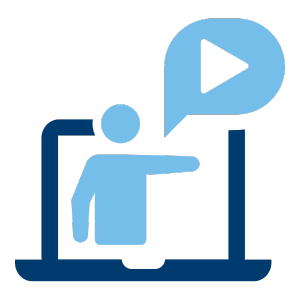Master of Science in Information Technology Leadership
Pathways & Curriculum

Request More Info
"*" indicates required fields
CURRICULUM DESIGNED FOR TODAY’S INFORMATION TECHNOLOGY LEADERS
The online MS in Information Technology Leadership degree program is designed for those who aspire to hold IT leadership positions in any organization. Graduates will develop a comprehensive understanding of IT fundamentals enabling them to effectively manage intricate systems and communicate the benefits of IT solutions to non-technical decision makers.
Graduates of the MS-ITL program will be equipped to evaluate the mission, resources and constraints of an organization to develop, communicate, deploy and maintain effective IT solutions — even if they are not subject matter experts in every technical area.
The MS-ITL degree is a 30-unit project-based program featuring two foundational courses, six core courses and a final semester course paired with a capstone project. The program is offered 100% online using the Canvas learning management system.
The MS-ITL program offers pathway options in Applied Data Science, Artificial Intelligence and Cybersecurity, enabling students to shape their academic experience around the technologies driving the future of industry. These pathways help build targeted expertise that supports career advancement and leadership readiness across today’s most critical IT domains.
Choosing a pathway enables you to:
- Focus your studies in an area aligned with your goals
- Expand your capabilities in a high-growth technical field
- Position yourself for advancement into senior IT leadership roles
NOTE: Courses and units/course subject to change until classes start.
20
Number of months it takes to graduate from the program
15–18
Average number of hours of coursework to expect each week
PROGRAM COURSE CURRICULUM
MS-ITL is a 30-unit program consisting of ten courses. Courses are offered year-round with three semesters every year: spring, summer and fall. Each semester lasts 14 weeks with courses running for seven weeks each. Students take two courses per semester with a one or two week break between semesters.
This concentrated format allows students to focus on one course at a time and to still complete the degree program in 20 months. Students are advised to spend 15-20 hours per week in each course in order to be successful.
The curriculum consists of the following courses:
| Course | Units |
|---|---|
|
Introduction to the IT Leadership program. Spotlights on fundamental financial management concepts: expense, capital, depreciation, budgets,… |
3 |
|
Project Management is the application of knowledge, skills, tools and techniques to project-oriented activities to meet project requirements… |
3 |
|
This course covers the role of wired and wireless networking in the architecture, deployment, and management of large-scale information tech… |
3 |
|
Server operations with emphasis on design and deployment of large-scale computing environments using cloud services (e.g., Amazon Web Servic… |
3 |
|
The role of IT in the continuous process of software development (engineering), staging (QA), and production deployment (IT operations). Inc… |
3 |
|
This course will feature a comprehensive overview of concepts and tools essential to cybersecurity for IT professionals. Students will learn… |
3 |
|
IT Service Management (ITSM) is the set of activities by which IT organizations manage the end-to-end delivery of IT services to customers. … |
3 |
|
In today’s competitive business environment, the ability to effectively manage enterprise applications and leverage data is a critical dri… |
3 |
|
This course focuses on a big-picture overview of the economic and social role of IT professionals. IT professionals are a strategic workforc… |
3 |
|
The program capstone focuses on developing a proposal for a significant IT infrastructure initiative, e.g., implementation of a new enterpri… |
3 |
Students can pursue an elective pathway by selecting up to 9 units of elective coursework focused in one of three technical areas: Applied Data Science, Artificial Intelligence or Cybersecurity. These electives are integrated into the standard 30-unit degree plan (the elective courses swapping with any of 3 non-required ITL courses: ITL 520, ITL 535 and ITL 545), giving students the option to explore advanced topics within a structured pathway without extending their time to graduation.
ELECTIVES
The MS-ITL program offers three special pathways that enable students to build technical depth in high-demand fields. Each option includes elective courses designed to enhance leadership capabilities while expanding subject matter expertise.
Data Science
Develop advanced skills in data analysis, modeling and responsible data practices. This pathway prepares students to lead data-driven initiatives in technology, government and enterprise environments.
Comprehensive Foundation in AI
Explore the design and deployment of intelligent systems through practical AI tools and techniques. Coursework emphasizes automation, machine learning and ethical decision-making in applied settings.
Cybersecurity
Build the expertise to lead secure infrastructure and system protection efforts. This pathway focuses on technical threat mitigation, risk assessment and the strategic management of cybersecurity operations.
TEACHING AND LEARNING Methods

Recorded Lectures

Recorded Computer Programming Videos

Live Weekly Office Hours*

Channel-based Messaging Platform

Supervision of Final Projects

Real-world Dataset Applications
*Not required or part of the final grade
Assessment Methods

Programming-based Assignments

Interactive Discussions

Project Based Assignments

Writing Professional Reports

A Comprehensive Capstone
DEGREE PLAN
Degree candidates are admitted throughout the year to begin their degree during one of three terms (spring, summer, fall). Students will take two courses during each 14-week term, focusing on one seven-week course at a time. This degree program can be completed, on average, in five terms (20 months).
Download a PDF of your degree plan that corresponds with your start term.
Important dates for your starting term can be found in the degree plan. Important dates for subsequent terms can be found in your student success center after acceptance.
STUDENT SUPPORT
USD provides support services from your initial inquiry through graduation and placement. As a nationally ranked institution, the University of San Diego (USD) is focused on an unwavering expectation: academic excellence. We want to help you become the changemaker you want to be!
Enrollment Advising
When you first inquire about one of our graduate degree programs, you will be assigned a personal Enrollment Advisor. Your Enrollment Advisor is available to answer your questions, help you assess your eligibility for admission and guide you through the application process. Your advisor will help you every step of the way from the moment you indicate your interest in a program through the entire application process. Our team of advisors can even help order your undergraduate transcripts, guide you through the process of writing your admission essay and ensure you are staying on top of deadlines.
Program Advising
A Program Advisor will be your primary point of contact for support once you are admitted and have formally registered for classes. When you first enroll, your Program Advisor will schedule a 15-minute introductory call to review technology/equipment requirements, connect you with resources for financial aid, GI Bill/VA funding, payment plans etc. and help you sign up for the online orientation. Over the course of your program, you’ll work with your Program Advisor to add/drop classes, coordinate credit transfers and address any technical challenges you might be experiencing. In fact, you can direct most university-related questions to your Program Advisor; if they do not have the answer, they will point you to the available resource that does.
Academic Advising
Each of our graduate degree programs has an Academic Advisor, who is responsible for evaluating applications and admitting new students, monitoring your academic progress and providing guidance as needed. Academic Advisors also serve as instructors for their respective programs.
Additional Support
Graduate Placement
Career Services at the University of San Diego acts as a centralized resource for USD students, alumni and employers. Career Services can provide you with online career tools and other resources to help you with your job search.
Learning Outcomes
The Master of Science in Information Technology Leadership program aims to provide IT professionals with the knowledge, skills and training to excel as IT leaders and managers.
Throughout their studies, students will:
- Demonstrate mastery over the fundamental building blocks of information technology solutions: data and voice networking, security, data management and reporting, enterprise applications (e.g., Workday, Salesforce) and server operations (e.g., AWS, Azure).
- Evaluate proposed and implemented information technology solutions from different angles within a variety of frameworks.
- Critically analyze existing information technology systems as well as IT solutions proposed by clients, internal customers or vendors, assessing requirements and resources (human, financial and technical).
- Design (or develop) and implement information technology solutions responsive to organizational requirements, aligned with resource constraints and strategic goals.
- Communicate effectively with stakeholders in order to accurately characterize problems to be solved within the context of strategic goals and available resources.
- Evaluate the ethical implications of proposed and implemented information technology solutions.
- For students choosing an elective pathway: Comprehend concepts and applications in data science, AI or cybersecurity to effectively communicate and drive solutions involving these technologies.
These outcomes are in addition to the graduate learning outcomes shared across all of USD’s masters level programs.
Frequently Asked Questions
Start
Your Future Now
With an MS in IT Leadership